Tile Styles
The ceramic tile you select will impact your home’s interior beauty, design, comfort, livability and upkeep. It’s a fact; floor coverings can make or break a home.
Due to the number of tile choices, patterns, colors, textures and price points shopping for tile can intimidate even the most experienced shopper.
3 types of ceramic tile
Click on a swatch below for more information
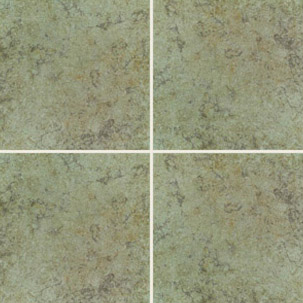
Glazed
- Coated with glass-forming minerals and ceramic stains
- Typically have a matte, semi-gloss or high-gloss finish
- Offer better stain and moisture resistance than unglazed
- High gloss finishes- more slippery and show scratches
- Matte or textured finishes- help with traction and scratches, dirt is less visible
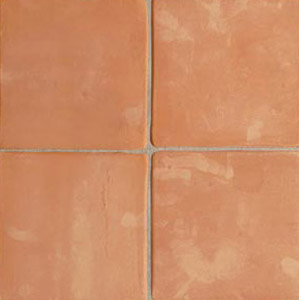
Unglazed
- Hard and dense
- Various surface treatments and textures
- Typically installed outside
- Good slip resistance
- Do require sealing to help prevent staining
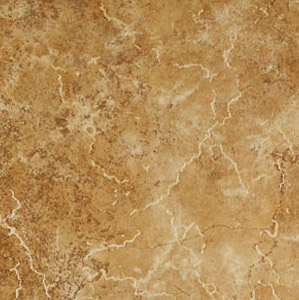
Porcelain
- Falls in the ceramic tile category
- Hardest and densest tiles available
- Color goes all the way through
- Non-porous
- Resist scratching
- Can withstand temperature extremes
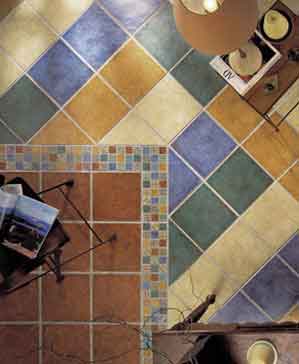
Size
- Manufactured in sizes ranging from 1” to 24” square
- Normally boxed and priced by the square foot
- Tile size is relative
- Referred to by nominal size, not its actual size
- During firing, ceramic tile will shrink by about 10% in size
- Most popular are larger sized tiles (13” by 13”, 16” by 16” and 18” by 18”)
- Determining tile size starts with the size of the room
- Small rooms don’t necessarily call for small tile
- Incorporating a larger size tile in a smaller room will visually increase the size of the space
- Fewer grout lines will help create a cleaner surface appearance
- Using a tile size that’s too small creates more grout joints that may make the floor look too busy
Cost-effective alternative
- Consumers prefer ceramic tile over stone due to price and maintenance
- Tile can also be made to feature heavy textures, chiseled and hammered edges, and resemble tumbled stone
- Tile texture is related to its style
- Feel of a tumbled stone or slate looking ceramic tile will be irregular and somewhat rough
- Tile simulating marble or granite will have a very smooth, polished feel
- Textures also vary in degree of shine, ranging from dull to semi-gloss to glass-like
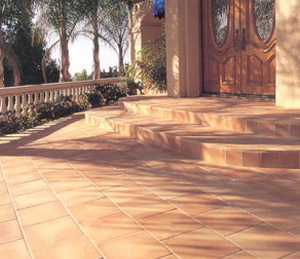
Exterior
- Tile is a versatile product
- Outdoor tile features non-skid finishes designed for safety
- Outdoor tile is resistant to frost
- Tile manufactured for outdoor use has very low water absorption, minimizing the cracking, chipping and other effects of expansion when the temperature falls below freezing
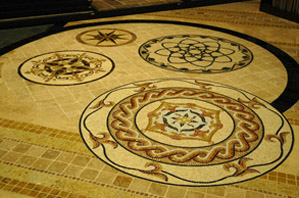
Customization
- Manufacturers also offer decorative inserts, medallions, and mosaics
- Tile size 2”x2” and smaller are usually referred to as mosaics
- Often used with different colors to create a pattern or decorative inset
- Smaller tiles also come in different shapes, such as a hexagon
- Patterned borders can be made up of different size tiles
- Variations in color, shape or size can be patterned within a room, or across adjoining rooms
- “Field tile” -the more prominent tile that is throughout the largest areas
- Floor and wall tiles may be designed to look similar
- Floor tiles are generally thicker and are textured to be safer to walk on
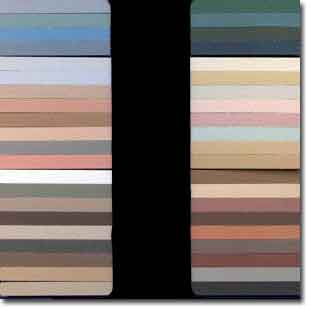
Grout
- Impacts the overall look
- Type of cement that is used to fill the space and provide support in tile joints
- Two types of grout; Portland cement based, and epoxy based
- Both may have sand added for additional strength
- Sanded grout is for tile joints 1/8th of an inch and larger
- Unsanded grout is an option used in joints that are smaller than 1/8th of an inch
- Can be pigmented to many colors, shades, and hues
- Pigment is added to the cement at the job site when the grout is mixed
- Color and thickness will change the appearance of the floor
- White or a light-colored grout highlights the color in tile
- Dark grout with a light tile, or light grout with a dark tile, will emphasize the geometric pattern of your layout







